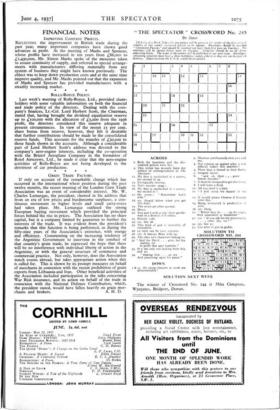FINANCIAL NOTES
IMPROVING COMPANY PROFITS.
REFLECTING the improvement in British trade during the past year, many important companies have shown good advances in profit. At the meeting of Marks and Spencer, whose profits have increased in ten years from £88,000 to £1,430,000, Mr. Simon Marks spoke of the measures taken to assure continuity of supply, and referred to special arrange- ments with manufacturers differing materially from any system of business they might have known previously. The object was to keep down production costs and at the same time improve quality, and Mr. Marks pointed out that the expansion of Marks and Spencer has provided manufacturers with a steadily increasing market.
* * * * Rou-s-RoYcE POLICY.
Last week's meeting of Rolls-Royce, Ltd., provided share- holders with some valuable information on both the financial and trade policy of the directors. Dealing with the com- pany's finances, Lt.-Col. Lord Herbert Scott, the Chairman, stated that, having brought the dividend equalisation reserve up to £100,000 with the allocation of £5,000 from the 1936 profit, the directors considered this reserve adequate in present circumstances. In view of the recent 25 per cent. share bonus from reserve, however, they felt it desirable that further contributions should be made to the consolidated reserve funds. This accounts for the transfer of £30,000 to those funds shown in the accounts. Although a considerable part of Lord Herbert Scott's address was devoted to the company's aero-engine interests, including the co-operation with the Bristol Aeroplane Company in the formation of Rotol Airscrews, Ltd., he made it clear that the aero-engine activities of Rolls-Royce are not being developed to the
detriment of car production. * * * * GRAIN TRADE FACTORS.
If only on account of the remarkabk change which has occurred in the international wheat position during the past twelve months, the recent meeting of the London Corn Trade Association was an event of considerable interest. Mr. W. Charles Lemarque, the president, showed in his address that from an era of low prices and burdensome surpluses, a con- tinuous movement to higher levels and small carry-overs had taken place. Mr. Lemarque outlined the strong European buying movement which provided the principal forces behind the rise in prices. The Association has no share capital, but is a company limited by guarantee to further the interests of the trade. It was evident from the president's remarks that this function is being performed, as during the fifty-nine years of the Association's existence, with energy and efficiency. Commenting on the increasing tendency of the Argentine Government to intervene in the conduct of that country's grain trade, he expressed the hope that there will be no interference with individual liberty of action in the Argentine, or with the general structure of commerce and commercial practice. Not only, however, does the Association watch events abroad, but takes appropriate action when this is called for. This is shown by its prompt measures on behalf of merchants in connexion with the recent prohibition of grain exports from Lithuania and Iran. Other beneficial activities of the Association included participation in the talks concerning War Risk insurance, and its action on behalf of the trade in connexion with the National Defence Contribution, which, the president stated, would have fallen heavily on grain mer-










































 Previous page
Previous page